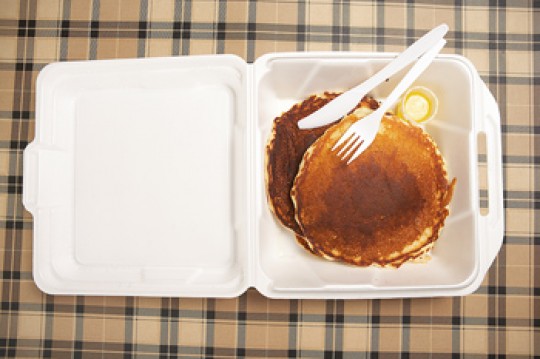In Defense of Breakfast
In Defense of Breakfast

With research earlier this month inciting a bunch of breakfast debate (you can read about the Nutritionstudy, here, which suggests that no matter how much people consume at breakfast, they go on to gobble the same amount of calories at lunch and dinner), we wanted to sit down with URMC registered dietitian Donna Quinzi to set the record straight.
Unfortunately, we had to reach Donna by phone – so we’re sans video this week. Luckily, we’ve captured some of her expert insights below.
The study suggests that hearty breakfasts might only pack on pounds. Is that true?
DQ: I think the thing to keep in mind is that this study focuses on breakfast size. And of course weight loss comes down to a simple formula – “burn more calories than you consume.” Follow this logic and it’s easy to see how overdoing it at breakfast (or any meal, for that matter) and making no compensation later on is going to upset your caloric balance.
What troubles me about this research is that too many people will give this a cursory read – maybe just the headline – and misconstrue it. The wrong take-away would be to assume that we should skip breakfast altogether! We know the exact opposite to be true. In fact, research from the National Weight Loss Registry (which is tracking behaviors and strategies of more than 5,000 people who have lost significant amounts of weight and kept it off for long periods of time) suggests that, for the overwhelming majority of participants, eating breakfast is an essential part of maintaining a healthy weight.
So, what should we focus on?
DQ: We need to be more concerned about defining good breakfasts, rather than focusing on“big” breakfasts. Good breakfasts include a good protein (e.g., low-fat yogurt, milk or cheese, eggs, nuts, lean meats, or peanut butter) paired with a high-fiber whole grain, (e.g., oatmeal, high-fiber cereals, and just about anything prefaced by the words “whole wheat”). These types of foods satiate and stick with you, minimizing that the chance that you’ll crave something else mid-morning. The opposite – white-flour-based foods and simple sugars – say, a stack of flapjacks drowning in a moat of syrup – is going to be digested quickly and leave you reaching for that donut at work. (Not that donuts themselves are inherently bad – it’s all about moderation!)
I know we shouldn’t focus solely on quantity, but can you give us a ballpark as to how many of our daily calories (as a percentage) should we allocate to our morning meal?
DQ: It’s up to you, but really, why not make it a full third of your daily calories? (Or, if you eat four mini-meals, then have it account for one-fourth.) There’s no reason that breakfast should be smaller than any other meal. Remember, the goal is to have it be satiating and substantial enough to tide you over, so you’re not ravenous (and at risk for overeating) the next time you sit down to the table.
So, let’s open it up to our blog readers: What breakfast foods keep you fueled all morning long?
###
* The above story is adapted from materials provided by University of Rochester Medical Center
![]() ______________________________________________________________________
______________________________________________________________________




















